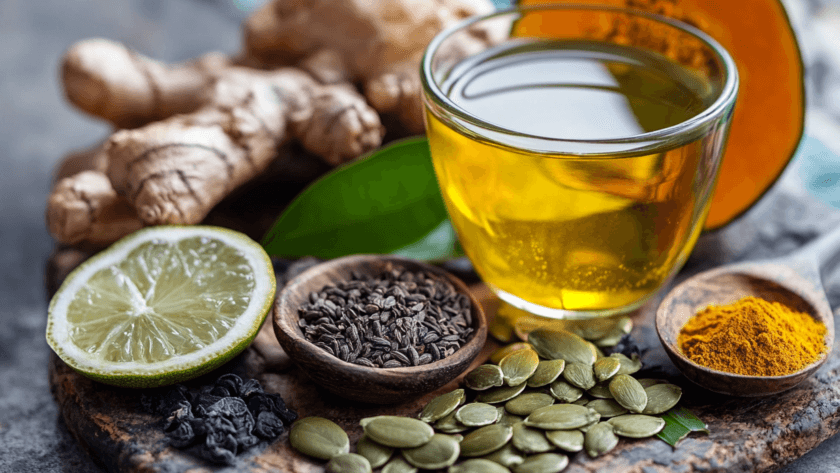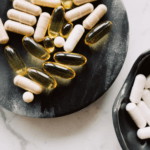Dihydrotestosterone (DHT) is a hormone derived from testosterone, and while it plays a critical role in sexual development and hair growth in certain parts of the body, high levels of DHT can lead to hair loss. DHT binds to androgen receptors on hair follicles, contributing to follicle miniaturization, shortening the hair growth cycle, and reducing hair density. This can result in hair thinning or male/female pattern baldness. In this article, we’ll explore natural DHT blockers that may help lower DHT levels, promote healthy hair growth, and prevent hair loss.
Contents
What is DHT?
DHT is a potent androgen (male hormone) that is produced when testosterone is converted by the enzyme 5-alpha reductase. About 10% of testosterone is naturally converted into DHT in both men and women. Although DHT is crucial for male development during puberty, including the growth of facial, pubic, and body hair, excessive DHT can lead to hair loss, particularly in individuals genetically predisposed to androgenetic alopecia.
In individuals with a sensitivity to DHT, the hormone can bind to receptors on hair follicles, triggering a miniaturization of these follicles. This makes the hair thinner, weaker, and more prone to falling out, often leading to significant hair thinning or baldness over time.
Foods That May Help Block DHT
Certain foods and nutrients may help block the action of 5-alpha reductase, the enzyme responsible for converting testosterone into DHT. Including these foods in your diet may naturally lower DHT levels and reduce the effects of DHT on your hair follicles.
Here are some natural DHT blockers that may help promote hair growth and reduce hair loss:
Green Tea
Green tea is rich in antioxidants, especially a compound called epigallocatechin gallate (EGCG), which has been shown to have anti-inflammatory, antioxidative, and hair growth-stimulating properties. EGCG works by protecting hair follicles, stimulating new hair growth, and preventing hair cell death, which is often triggered by excessive DHT. A 2019 review found that EGCG could be beneficial in protecting the scalp and encouraging hair growth, though more research is needed to fully confirm its effectiveness in humans.
Incorporating green tea into your diet or taking green tea supplements may help promote hair health and combat DHT-induced hair loss.
Coconut Oil
Coconut oil, made from the meat of coconuts, contains medium-chain triglycerides (MCTs), particularly lauric acid. Preclinical studies have shown that lauric acid can block the activity of the 5-alpha reductase enzyme, thus reducing the production of DHT. While these studies have been conducted in animal models and test tubes, coconut oil may still offer potential benefits for hair loss prevention.
Coconut oil can be applied topically to the scalp to help nourish and protect hair follicles while also providing anti-inflammatory benefits. It may also be consumed as part of a healthy diet, as it supports overall well-being.
Onions and Quercetin-Rich Foods
Onions are a rich source of quercetin, a flavonoid antioxidant that has been shown to inhibit the production of DHT by blocking the 5-alpha reductase enzyme. Quercetin also reduces oxidative stress, which can contribute to hair loss.
In addition to onions, other quercetin-rich foods include apples, berries, spinach, kale, and asparagus. These foods help protect hair follicles from damage, promote hair regeneration, and reduce inflammation, all of which contribute to healthier hair growth.
Turmeric
Turmeric is well-known for its anti-inflammatory and antioxidant properties, thanks to its active compound, curcumin. Some preclinical studies suggest that curcumin can lower DHT levels by blocking the activity of 5-alpha reductase. Though more research in humans is needed, turmeric may still offer benefits for reducing DHT levels and promoting hair growth.
Adding turmeric to your diet through curries, smoothies, or teas may provide both systemic health benefits and support your hair health.
Pumpkin Seeds
Pumpkin seeds are rich in magnesium, zinc, iron, and essential fatty acids, all of which are vital for hair health. A 2021 study found that applying pumpkin seed oil for three months helped prevent female-pattern hair loss and promoted hair growth. Pumpkin seed oil has been found to inhibit 5-alpha reductase activity, thus reducing DHT production.
You can incorporate pumpkin seeds into your diet by adding them to salads, smoothies, or simply enjoying them as a snack. Additionally, pumpkin seed oil can be used as a topical treatment for the scalp to boost hair health.
Edamame
Edamame, or young soybeans, contain isoflavones, plant compounds that may help lower DHT levels by blocking the action of 5-alpha reductase. A 2007 study found that supplementing with soy protein, which contains isoflavones, helped lower DHT levels in males.
Consuming edamame or other soy-based foods like tofu and tempeh can provide both nutritional benefits and support healthy hair growth by reducing DHT levels.
Saw Palmetto Berries
Saw palmetto is a popular herbal supplement that has been studied for its potential to block DHT production. The berries contain compounds that inhibit the activity of the 5-alpha reductase enzyme, thereby reducing the conversion of testosterone to DHT. Several studies have shown that saw palmetto can help prevent hair loss and promote hair regrowth in individuals with androgenetic alopecia.
Saw palmetto can be consumed as a supplement or as part of hair care products such as shampoos and conditioners.
Avocados
Avocados are packed with healthy fats, vitamins, and minerals, including vitamin E and B-vitamins, which are essential for healthy hair growth. They also contain monounsaturated fats that nourish the scalp and help maintain moisture levels.
While avocados are not directly linked to blocking DHT, their high nutritional content supports overall scalp and hair health, which may indirectly protect against DHT-induced hair loss.
Berries
Berries, such as strawberries, raspberries, and blueberries, are rich in antioxidants that help combat oxidative stress on the scalp. This stress can exacerbate hair loss caused by high DHT levels. Additionally, the vitamin C in berries promotes collagen production, which strengthens hair follicles and supports healthy hair growth.
Including a variety of berries in your diet can help improve scalp health and protect hair follicles from damage.
Cucumbers
Cucumbers are rich in silica, a trace mineral that is essential for hair health. Silica promotes hair growth and helps prevent hair loss. The high water content in cucumbers also keeps the scalp hydrated and nourished, which is essential for optimal hair follicle function.
Cucumbers can be consumed in salads, sandwiches, or as a refreshing snack to support hair health and prevent DHT-related hair loss.
Additional Tips for Combating DHT-Induced Hair Loss
While incorporating DHT-blocking foods into your diet can help lower DHT levels and prevent hair loss, other lifestyle changes and treatments may also support hair growth:
- Exercise Regularly: Regular physical activity can help balance hormone levels and reduce stress, both of which contribute to hair loss.
- Manage Stress: Chronic stress can increase cortisol levels, which in turn may increase DHT production. Practicing relaxation techniques, such as meditation or yoga, can help manage stress and promote hair health.
- Avoid Harsh Hair Care Products: Certain hair care products, such as those containing sulfates or parabens, can damage hair follicles. Opt for gentle, sulfate-free shampoos and conditioners to protect your hair.
- Get Enough Sleep: Sleep is crucial for hormonal balance and overall health. Aim for 7-9 hours of quality sleep each night to support hair growth.
- Consider Supplements: In addition to dietary changes, supplements like biotin, zinc, and saw palmetto may provide additional support for hair growth and DHT blocking.
Additional Tips for Supporting Hair Health Naturally
- Balanced Diet: A nutrient-rich diet with vitamins (A, C, D, E), biotin, iron, and protein is essential for overall hair health.
- Scalp Care: Regularly cleanse and exfoliate your scalp to prevent buildup that can clog hair follicles and hinder hair growth.
- Stress Management: Chronic stress can worsen hair loss. Practices like yoga, meditation, and regular exercise can help reduce stress levels, supporting healthier hair.
Conclusion
DHT is a major contributor to hair loss, particularly in individuals with androgenetic alopecia. While medications and treatments may be available to block DHT, certain foods offer a natural way to reduce DHT levels and promote healthy hair growth. Green tea, coconut oil, onions, pumpkin seeds, and edamame are just a few examples of foods that may help block DHT and prevent hair loss. By incorporating these foods into your diet and adopting other healthy habits, you can naturally combat the effects of DHT and support the growth of strong, healthy hair.



